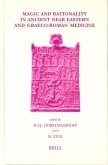This book is a study of the ways in which Galen sought to establish the brain as the regent part (hegemonikon) of the body, utilising a rigorous anatomical epistemology and an often sophisticated (but perforce limited) set of physiological arguments Part One surveys the medical and philosophical past in which the study of the brain occured, and looks at the materials and methods which Galen employs to legitimate his hegemonic argumentation. Part Two examines Galen's anatomical understanding of the brain, especially the ventricles. Part Three offers a critical evaluation of Galen's physiolgy of the brain. This is the first monograph to offer a detailed account of this subject, setting it within the cultural and intellectual contexts of its era, and will be of interest to those in classics, medical history, history andphilosophy of science and the history of ideas.
Hinweis: Dieser Artikel kann nur an eine deutsche Lieferadresse ausgeliefert werden.
Hinweis: Dieser Artikel kann nur an eine deutsche Lieferadresse ausgeliefert werden.








